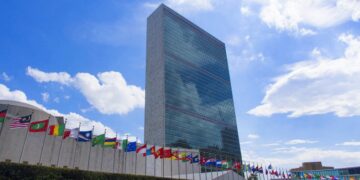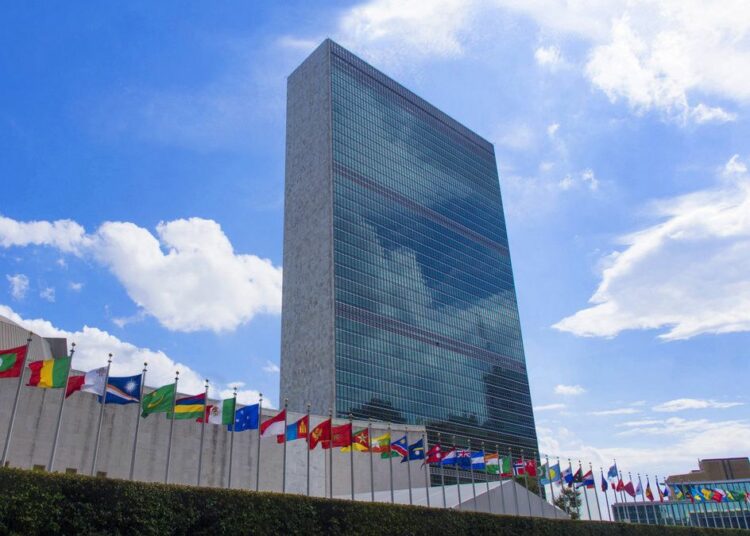The following statement by IOF, joined by organizations around the world, was provided to all UN ambassadors and their missions in advance of the Commission on Population and Development held in New York City from April 10 to 14, 2023.
Administrations Change but Truth Does Not:
The Continuing Force of the Geneva Consensus Declaration
Dear Excellency:
As the Commission on Population and Development undertakes the work of its 56th session, we wish to call your attention to the October 22, 2020 event that marked a momentous exception to the ancient assertion that “there is nothing new under the sun.”[1] On that date a coalition of 32 nations,[2] representing a fifth of the world’s population, joined in the Geneva Consensus Declaration[3] (GCD) to protect the fundamental pillars of their societies. The signing ceremony was introduced by Valerie Huber, U.S. Special Representative for Global Women’s Health.
Today is historic! Standing together virtually are senior officials from governments representing every region of the world and more than 1.6 billion people: cabinet level ministers, ambassadors, members of Congress and Parliament, and others. We are also joined by NGOs from across the globe who are celebrating today’s historic event.
Hosting the ceremony was Alex Azar, Secretary of U.S. Health and Human Services, who noted, “The declaration is much more than a statement of beliefs; it is a critical and useful tool to defend these principles across all United Nations bodies and at every multilateral setting using language previously agreed to by member-states of those bodies.” The declaration’s four pillars stand as essential guideposts for leaders and policymakers everywhere.
- Women’s health. The GCD reaffirms “the equal right of men and women to the enjoyment of all civil and political rights.”[4] It further reaffirms “women’s “contribution to the welfare of the family and to the development of society,”[5] and that “universal health coverage is fundamental for achieving the Sustainable Development Goals related not only to health and well-being.”[6] It also commits to “improve and secure access to health and development gains for women, including sexual and reproductive health, which must always promote optimal health, the highest attainable standard of health, without including abortion.”
Our comment: Pope Francis has stated, “If we want a better world that is a house of peace and not a courtyard of war, we must take to heart the dignity of every woman…. A victory for women is a victory for all of humanity.”
- Unborn life. The GCD reaffirms the inherent “dignity and worth of the human person,”[7] and that “the child… needs special safeguards and care… before as well as after birth,”[8] that “motherhood and childhood are entitled to special care and assistance,”[9] and that “there is no international right to abortion.” It further reaffirms that “in no case should abortion be promoted as a method of family planning” and that “any measures or changes related to abortion within the health system can only be determined at the national or local level according to the national legislative process.”[10]
Our comment: Mother Teresa warned that “the greatest destroyer of peace today is abortion, because it is a war against the child, a direct killing of the innocent child.” Therefore, “protect the unborn child, the greatest gift of God for each of us and for the world.”
- National sovereignty. The GCD reaffirms “the importance of national ownership and the primary role and responsibility of governments at all levels to determine their own path towards achieving universal health coverage, in accordance with national contexts and priorities,”[11] and commits to support “the long-standing international consensus that each nation has the sovereign right to implement programs and activities consistent with their laws and policies.”
Our comment: This foundational principle is enshrined in Article 2.1 of the United Nations Charter: “The Organization is based on the principle of the sovereign equality of all its Members.”
- The family. The GCD reaffirms that “the family is the natural and fundamental group unit of society and is entitled to protection by society and the State,”[12] and commits to support “the role of the family as foundational to society and as a source of health, support, and care.”
Our comment: Ambassador Michael Novak stated, “Political and social planning in a wise social order begins with the axiom ‘What strengthens the family strengthens society’…. The roles of a father and a mother, and of children with respect to them, is the absolutely critical center of social force.”
One of the first acts of the new U.S. Administration that took office in January 2021 was to withdraw from the GCD. Administrations change but truth does not. Now available in several languages and backed by a coalition of 37 nations,[13] the GCD remains a guiding star to protect nations and civilization itself. We urge that its principles guide the work of this year’s Commission on Population and Development. Thank you.
Respectfully,
- International Organization for the Family
- United Families International
- Center for Family and Human Rights
- CitizenGO, Spain
- Latin American Alliance for the Family
- American Family Advocates, New York
- Family Policy Institute, South Africa
- Provive, Venezuela
- HazteOir, Spain
- Family First, New Zealand
- FamilyPolicy.RU Advocacy Group, Russia
- Universal Peace Federation
- Native American Fatherhood & Families Association
- Institute for Family Policy
[1] Ecclesiastes 1:9.
[2] Bahrain, Belarus, Benin, Brazil, Burkina Faso, Cameroon, Democratic Republic of the Congo, Republic of the Congo, Djibouti, Egypt, Eswatini, Gambia, Georgia, Haiti, Hungary, Indonesia, Iraq, Kenya, Kuwait, Libya, Nauru, Niger, Oman, Pakistan, Paraguay, Poland, Saudi Arabia, Senegal, South Sudan, Sudan, Uganda, United Arab Emirates, United States of America, and Zambia.
[3] Available with footnotes at https://eclj.org/abortion/un/the-geneva-consensus-declaration-an-unprecedented-international-pro-life-coalition?lng=en.
[4] United Nations General Assembly. (1966). “International Covenant on Civil and Political Rights” (Article 3). New York.
[5] United Nations Fourth World Conference on Women. (1995). “Beijing Declaration and Platform for Action” (Annex II, Paragraph 29). Beijing.
[6] United Nations General Assembly. (2019). “Political declaration of the high-level meeting on universal health coverage” (Paragraph 5). New York.
[7] United Nations General Assembly. (1948). “Universal Declaration of Human Rights” (Preamble). Paris.
[8] United Nations General Assembly. (1959). “Declaration on the Rights of the Child” (Preamble). New York.
[9] United Nations General Assembly. (1948). “Universal Declaration of Human Rights” (217A [III], Article 25[2]). Paris.
[10] United Nations International Conference on Population and Development. (1994). “Programme of Action of the International Conference on Population Development” (Section 8.25). Cairo.
[11] United Nations General Assembly. (2019). “Political declaration of the high-level meeting on universal health coverage” (Paragraph 6). New York.
[12] United Nations General Assembly. (1948). “Universal Declaration of Human Rights” (217A [III], Article 16(3)). Paris.




















Discussion about this post